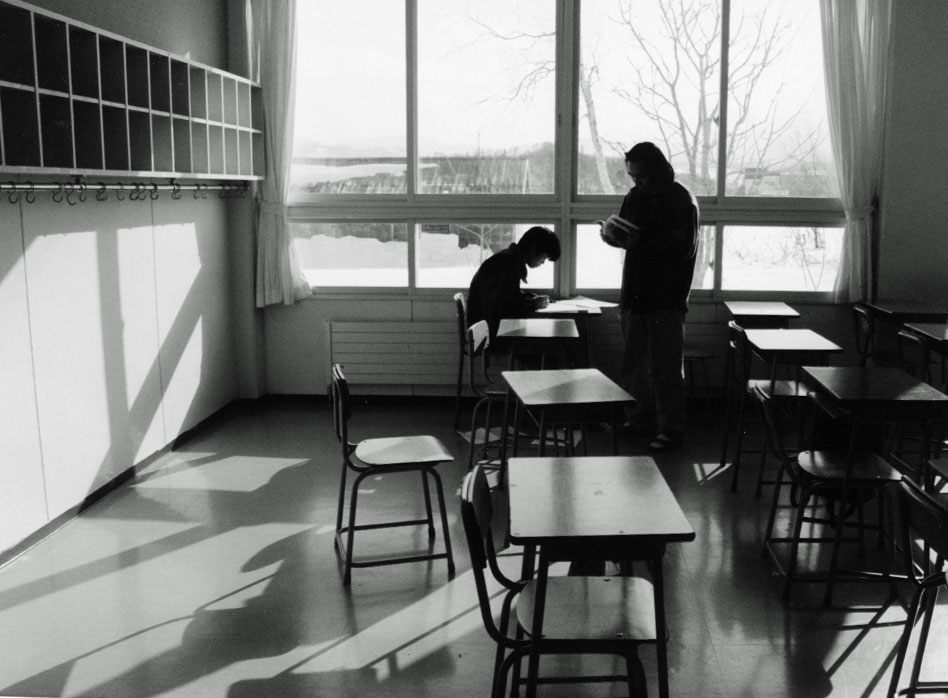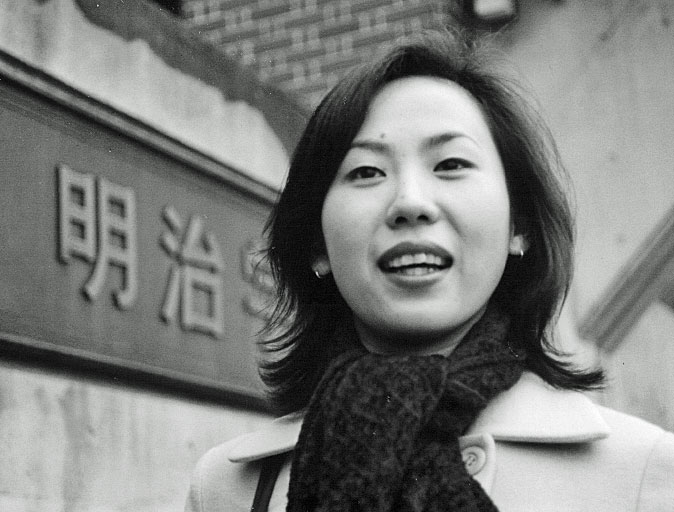Taiwan, Hong Kong, UK & Japan Attempt by a SchoolFeburary 1998
As shocking incidents caused by juveniles have occurred in many places, juvenile issues such as educational reforms, amendments to the Juveniles Act and children’s rights are highly controversial. Meanwhile, more than 70,000 children refuse to go to school and more than 110,000 high-school students drop out every year. I wonder how schools in question deal with those issues. I covered the story of a high school that has positively accepted troublesome juveniles in the turmoil of bulling, violence and refusal to go to school to make them regain their footings. The school is Hokusei Gakuen Yoichi High School in Yoichi Town, Hokkaido.
Ten years have passed since the high school started to accept juveniles who want to enjoy a high-school student life.

Ten years have passed since Yoichi High School opened its doors to dropouts from high schools in the whole country or to students who couldn’t go on to a high school because they hadn’t attended elementary school or junior high school. About two thirds of 640 students of the 1997 whole school were such students and the other one third were students who couldn’t keep up with their classmates. Even if a student got only 1.5 or so on average according to the five-grade evaluation system, he/ she will be admitted to this school if he/she wants to enjoy high-school student life and swears not to use violence or cut class.
There are 17 classes and 37 full-time teachers in this school, and the ratio of boys to girls is three to one. The students who come from all parts of Japan outside Hokkaido including Kyushu and Okinawa have accounted for half of the whole school since seven years ago. This school is making efforts to make their students complete the high school course and to help them go on to university or find a job, and also trying to lower the dropout rate of 7 %.
The students here prepare for the next lessons altogether in the classroom? they’ll get interested in the lessons if they can understand them.

It was in the classroom because of the early spring sunlight reflected by the snowfield. The starting chimes had rung, but the students were not ready for study. They were still sleeping at the desk, chattering with their friends, throwing spitballs at each other, looking in a hand mirror, reading a comic book absorbedly, or even talking on a cell phone. Ms. Hiroko Yama (51) called to the students in the corridor to come in before she entered the classroom. She started to call the roll by their first names or nick names. When one of the students, who might be a late riser and often came late, answered her call, another student called to him, “Hey, you made it today.”
Even after the lesson started, there was a student who was walking around in the classroom to borrow a pencil from his friend. The students were dressed like college students because they don’t have to wear uniforms at this school. Although there is a regulation on their hairstyle, there were a couple of students with their hair dyed brown in each class. There was also a boy who was wearing a pierced heavy-metal earring. Ms. Yama said to one of the students, stroking his head, “What showy hair! If you don’t do well at study, you’ll be sorry,” but she didn’t press him. Then one of his classmates said to him teasingly, “Don’t worry. You’re smart enough, aren’t?”
The experienced teacher stayed calm and drew all the students into her lesson gradually by interspersing banter interpretable as both jokes and warnings. Around 20 minutes after the lesson started, the classroom that had been very noisy became as silent as the grave. About 15 minutes later the students were concentrating on the lesson. It was a Japanese lesson. The students were answering the questions written on a handout, looking in the essay that would be taken up for the next lesson. If students don’t understand lessons, they feel bored. Actually students should prepare their lessons by themselves at home, but in this school they do it in class altogether so that everyone could take interest in lessons. In this way the students make progress slow but steadily.
The school not only devises efficient teaching method but also encourages the students to participate in the activities of the student council, club activities, and events such as a walking excursion, a speech contest, an annual school festival and winter sports, so that each of the students can bring their abilities into full play and put their heart into one of the activities. Moreover, the school offers as many as 20 “general” courses such as the courses in Hokkai Soran drum, Ainu culture, pottery, guitar, swimming, golf and the like to cultivate a positive attitude toward learning in a field that they are interested in.
“What a bother! Get out!” has an opposite effect.
The principal of the school Tetsuya Fukaya (61) remarked on school violence like a knife attack case. “Many people think our school teachers should be very careful, but the worry is absolutely unnecessary.” He laughed it off and explained this school’s idea of education convincingly, “Generally speaking, the violent acts of students are their reaction against pressure from teachers. The more teachers press down students, the more rebellious the students become. Teachers, however, should not indulge students. Teachers should teach them what is right and what is wrong. And also both teachers and students should respect each other as a human being.”
In his opinion, the words “What a bother you are! Get out!” don’t work at all. Deserting a troublesome student or leaving him to do as he likes has an opposite effect. “A kid who makes trouble wants to attract his teacher’s attention. But when he notices that he is ignored, he will feel very miserable. That’s a pity. In our school we ask a troublesome student why he makes trouble. While he is telling his story, he becomes aware of having done wrong.” He added, “This goes for children who use violence. If an adult inflicts a physical punishment on them, it will only drive them to frenzy. So it’s better to calm them down first and then let them talk about the reason why they have used violence.”
“If adults try to control adolescents, who are developing while being faced with many difficulties, friction between the adults and the kids will mount unnecessarily. We tell our students it is important to live in the right place where they can stand on their own feet,” he remarked. 33 years ago when the school was established, eight young teachers gathered, including Principal Fukaya, with an ideal of winning students’ hearts. The ideal has still its freshness.
A middle-aged man talks to kids like a Dutch uncle? cooperation with the community

About 400 students are lodging at 20-odd houses in the town. The city-bred students were brought up indulgently in a nuclear family. Simple and unaffected local people talk to such pampered students like a Dutch uncle, so they have great influence with them. An owner of Boarding House Noshiro, Nobuaki Noshiro (53), who is taking care of 24 students, has stayed every night in a room near the front door of the boarding house.
Noshiro makes it a rule to tell this to a new boarder. “Everyone comes here with a sense of failure. But nobody knows here what happened in his/her past, including teachers and classmates. So forget your past and start afresh here.” He told me that he had not been able to read the mind of sensitive adolescents before. One day he scolded a student too severely and the student went home in Sapporo, walking all night. “Now I can see whether a student who cuts class is cracking up or playing truant.” He has the knack of telling off.
According to him, there are parents who never talked about education or tried to join school events until they sent away their children, while there are parents who never showed up for three years. He is liked by the boarders and called ‘Uncle.’ He gives parents some advice. It goes, “The worst thing is to make a kid feel that he is deserted by his parents and teacher. If the kid understands that his parents and teacher are trying to do their best to help him, he will surely get back on the right track, however hopeless he seems to be.”
A knife attack case–“I think it happened because the teacher turned a blind eye to the student,” said one of the students.
I talked with Teppei (18, a high school junior), who was playing basketball in the gym after school. He said, “The teachers in my former school were bossy, but the teachers here are friendly. We don’t get a telling-off even if we don’t use respect language. We can talk with them as if we are friends.” He knew that the teachers here devoted themselves to their students. The teachers in this school help students with their studies or club activities till late at night, and sometimes they treat students to homemade dishes at their home. “Even the fellow who made a knife attack can be rehabilitated here. I think he overleaped himself because his teacher shut his eyes to his bad behavior,” said Teppei.
The reason why Fukaya started to accept troublesome students was that the school was in financial difficulties because the number of students had fallen as the birthrate was on the decrease. For the same reason, he started to board the students out at the houses in the town. The school didn’t have a building fund for a dormitory. He told me this honestly, looking back on those days. In February of this year, the Central Education Council made an interim report. It said that we should not bother about ranking, and we should make good use of support from the local communities. It turned out that Yoichi High School had carried out these proposals since ten years ago.
“Try to find what you really want to do,” says Yuki Tamura, a senior of the department of sociology of Meiji Gakuin University.

Yuki Tamura (22) said, “When I was a junior high school student, laughter in the classroom made me feel as if I was laughed at and my stomach ached.” Her school record was not so good because her weak subjects, science and math, kept her from succeeding. She thought Hokusei Yoichi High School was more hopeful than a nearby school on a low level, and she went to Yoichi High School. But in her freshman year she wasn’t happy at all. She was afraid of the eyes of her seniors at the boarding house and she was not able to fit into the class because there were some athletic dropouts from other schools among the classmates. She wept night after night and called her home in Yokohama. She went home almost every month.
But she changed after she had participated in the annual school festival held in her second year. She opened a spaghetti booth at the festival with her friends. They worked hard together to offer delicious spaghetti, working out a menu and go shopping for the ingredients. She was absorbed in this work. Timely she got some advice from her homeroom teacher. “There are all sorts of people in the world, even in here. You cannot avoid the people who have different values from yours.” At his words she realized that she had built a wall around herself as if she had been the heroin of a tragedy. About that time Yuki decided to materialize her dream of becoming a teacher that she had already dismissed from her mind in her junior high school days. Yuki also said she would never forget her homeroom teacher in her first year of the high school. When she was depressed, he often visited her at her boarding house, although he had many things to attend to.
She remarked on the recent juvenile crimes, “I sympathize with the children who are forced to take adult values. I think it’s important to find what they really want to do and to accomplish it. Even if they don’t become rich, they will live happily, I believe.” She will graduate from university this spring, but she is going to study one more year at university as an auditor to become a school nurse. She is trying to carve out her ‘happy life’ for herself.
“Review on the points that should be reformed,”?Professor Hidenori Fujita of the department of education of Tokyo University
“Yoichi High School has been successful by pursuing what their students need the most,” said Professor Hidenori Fujita (53). According to his analysis, various problems including violence, bulling, refusal to go to school and dropout have arisen at schools after the middle of the 1970s, when the ratio of students who go on to high school exceeded 90% and high school education became practically compulsory. Young people started working in their late teens before, but as industrialization has advanced highly, they don’t have to do so, and they are given some time for moratorium. He said that we shouldn’t ignore this reality when we tried to reform the education system.
Some people, mainly in the economic world, think that the 6-3-3 system of education doesn’t go well with the times, so that a junior high school course and a high school course should be combined or the subjects should be narrowed down to reading, writing and arithmetic to give children more holidays or latitude in their studies. He, however, casts doubt on it. He said, “Although it took a half century, Japanese people can receive a standard education equally now. We owe it to the present system of education. Why should we change this system we can boast to the world?”
In his opinion, piles of problems surely lie at schools, but the problems are not concerned with the system of education but with its substance. School violence became a serious problem in America in the 1970s and refusal to go to school became a serious problem in England in the 1980s. The problems in those countries arose under the free-school system contrary to Japanese regulated system. The reason why many students drop out in Japan is not because lessons are boring or teachers teach students too many things, but because teachers don’t take time to teach them deliberately. He thinks that experience is more important than latitude to develop students’ individuality and creativity. For this reason he has some misgivings about ‘the minimum necessary standards of education.’
Troubles made by juveniles can be mostly attributed to their environment including their school, home, community, the mass media and consumption culture. But since a school is their stage of life, there is a tendency to make a school scapegoat. And also the government can control the education system more easily, so that schools tend to bear the brunt of criticism.
“Education is a labor-intensive industry the same as welfare. It requires a lot of money, labor and effort to improve. To review where to be reformed is more important than to worry about taxpayers’ estimation or favor,” Professor Fujita remarked.
